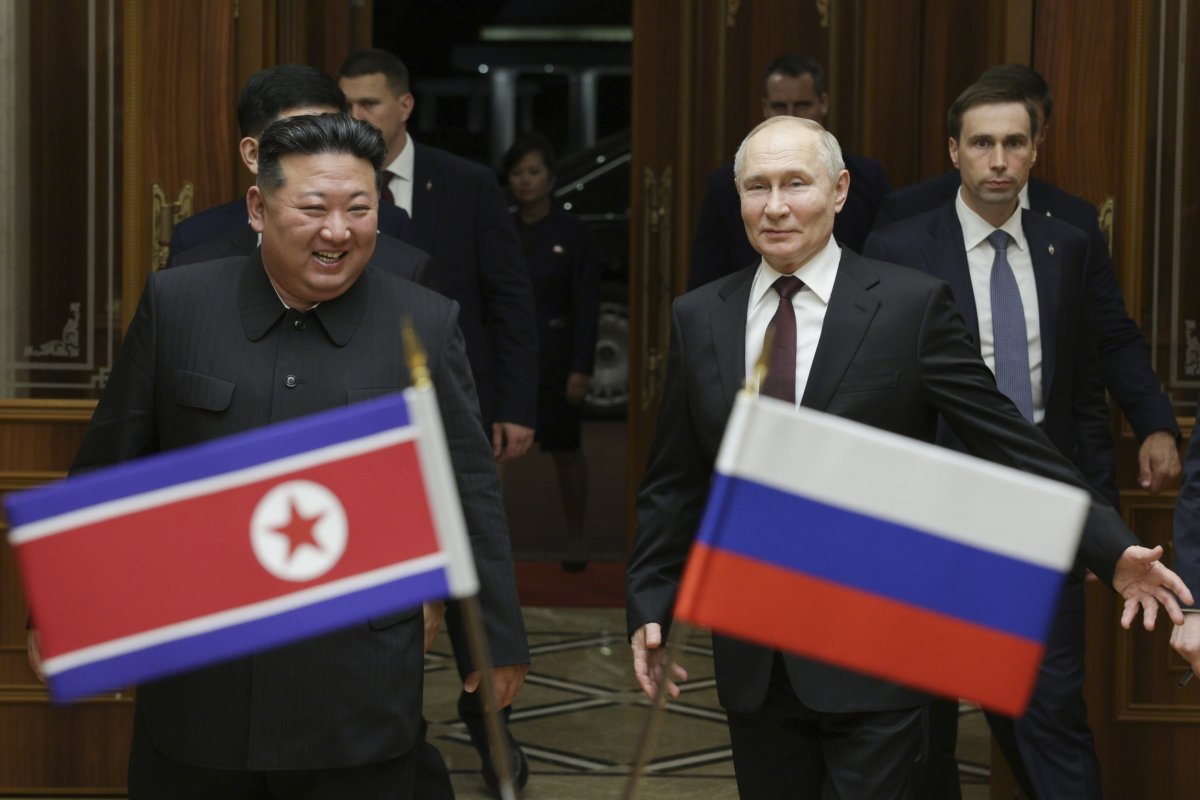Kim Jong Un has exploited failures in the international sanctions framework to source missile components from the West, some of which have ended up on the frontlines in Ukraine.
“Wreckage from North Korean missiles fired by Russia at targets in Ukraine has shown continued dependence on imported microelectronics,” one expert told Newsweek, “including goods from companies in Germany, Japan, the Netherlands, Switzerland and the US.”
Daniel Salisbury is an associate fellow at the Royal United Services Institute and a senior research fellow at the Department of War Studies at King’s College London.
On Tuesday, Salisbury published a paper entitled “Shopping for Mass Destruction,” which outlined the “illicit procurement networks” on which the isolated state has relied to produce weapons for its own use and the use of its allies.
“In the past few years the DPRK has continued to rely on imports to supply its WMD programs,” Salisbury told Newsweek.
Korean Central News Agency via AP
North Korea’s missile tests and weapons of mass destruction programs have attracted substantial international condemnation, and it appears that Pyongyang has sourced many of the “dual-use” technologies needed for these initiatives, including electronic components and machine tools, from abroad.
“The DPRK clearly undertakes regular shopping operations for these and other dual-use goods from overseas markets, particularly in China and Russia,” Salisbury said.
However, while these two states are well-acknowledged trading partners of North Korea, Salisbury said that Kim Jong Un was also acquiring technology from countries that publicly oppose these programs.
He cited February research from Conflict Armament Research, which revealed that 290 imported components were found in the wreckage of a ballistic missile in Ukraine, procured from 26 countries including China, Germany, Japan, the Netherlands, Singapore, Switzerland, Taiwan and the U.S.
However, sourcing equipment for Moscow as well as its own weapons programs has put a strain on Pyonyang’s own resources, increasing its reliance on global imports.
According to Salisbury, “North Korea’s supply of munitions and particularly missiles to Moscow likely creates greater demand now for materials and components, as North Korea will likely look to carry on its own missile development and manufacturing alongside those for export to Russia.”

Korean Central News Agency/Korea News Service via AP
Salisbury said that his research revealed the sophistication of the country’s procurement networks, but also the failure of Western sanctions against Kim Jong Un.
North Korea is currently sanctioned by numerous states and supranational bodies as a result of its unlawful nuclear weapons program and record of human rights abuses.
However, through an “opaque” network of front companies, as well as potentially hundreds of globally stationed “procurement agents,” Salisbury’s report outlined how North Korea was able bypass these controls with relative ease.
“Sanctions cannot prevent proliferation by determined states, particularly when they have spent many years acquiring, indigenizing and developing technologies,” Salisbury told Newsweek.
“The DPRK has had 40 plus years to develop procurement networks, which are constantly innovating,” he added. “They are able to outwit slow government bureaucracies due to their ability to adapt quickly.”

Gavriil Grigorov/Kremlin Pool Photo via AP,
His paper identified the country’s “renewed relationship with Russia” as “perhaps the most important factor that will shape the future of North Korea’s procurement networks.”
North Korea and Russia have deepened their military ties in recent years, culminating in a strategic partnership signed between the pair in June, detailing commitments for broader cooperation in the military, foreign policy and trade realms.
“If Moscow were to formally offer strategic technologies to Pyongyang, or to allow North Korea’s operatives to openly shop on a larger scale from Russian providers, this could be bountiful for North Korea’s procurement needs,” Salisbury wrote.
His paper ended with ten recommendations for Western states “seeking to counter North Korea’s illicit procurement.”
Among these was a “honing” of export controls, and prevent technology transfers to China and Russia, North Korea’s primary vendors.
Other recommendations included replacing the UN Security Council’s Panel of Experts for North Korean sanctions, dissolved in April, and to “challenge” the burgeoning relationship between Putin and Kim Jong Un.
Do you have a story we should be covering? Do you have any questions about this article? Contact LiveNews@newsweek.com.

